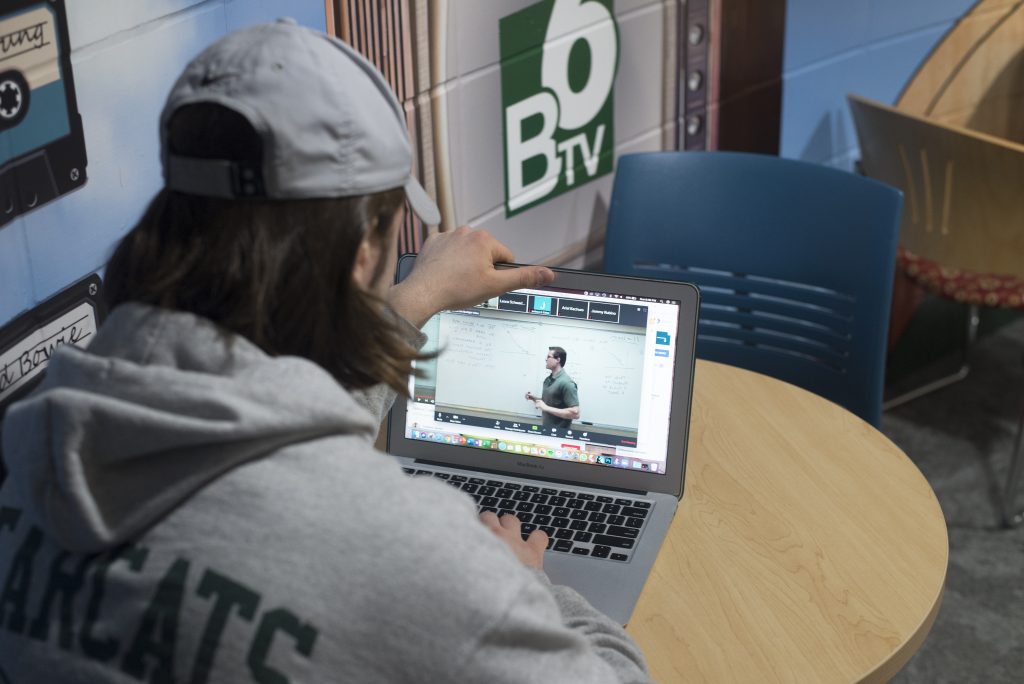After Gov. Andrew Cuomo announced that New York state was declaring a state of emergency on March 12 because of the coronavirus pandemic, he required that SUNY and CUNY schools transition entirely to an online format by Thursday, March 19. In light of the announcement, Binghamton University chose to use Zoom Video Communications to connect students with their instructors and classmates remotely.
According to a B-Line announcement sent to the campus community on Monday, March 9, the University purchased an enterprise site license of the web-conferencing software to accommodate everyone needing to complete the spring semester online.
Every BU student, faculty and staff member has access to a Zoom account by visiting binghamton.zoom.us, or by receiving a link for a scheduled meeting. Logging into Zoom uses the same username and password as a University Pods account, so students do not have to create a new account. Once a Zoom meeting link has been clicked, the user will be prompted to download the Zoom application to their desktop. The app includes video and audio calling from both computers and mobile phones, conference calls that can accommodate hundreds of users at once, screen sharing, event scheduling and more.
Previously, BU utilized Cisco Webex web-conferencing software, but in Monday’s B-Line announcement, Webex users were told they would need to transition to Zoom no later than April 15. The announcement included a number of resources for troubleshooting, including the University Center for Training and Development, the Information Technology Services (ITS) help desk and the Center for Learning and Teaching (CLT). When students log into their BU Zoom accounts online, the left-side panel includes a link labeled “Video Tutorials” that can further help users navigate video conferencing.
Students are also able to visit a support page at www.binghamton.edu/students-online/ that includes study strategies, technical challenges and instructions on how to access online tutoring and more, according to a separate B-Line announcement sent on Sunday, March 15. In the announcement, Donald Nieman, provost and executive vice president for academic affairs, said University administrators recognize this transition may not go perfectly.
“The disruption to our normal semester is completely unprecedented for all of us and I know that the changes and cancellations, combined with the greater uncertainty about the impact of the coronavirus outbreak in your home community as well as here, have had a tremendous impact on you,” Nieman wrote in the B-Line announcement. “We understand the fear, disappointment and anxiety that can set in with disruption of this magnitude.”
Dan Gottlieb, a first-year graduate student studying biology, is optimistic about the transition to online conferences.
“Obviously the communication will be a little bit difficult, but as long as people put in the effort you can still absolutely learn,” Gottlieb said. “It will be effective as long as students cooperate and put in the effort.”
Julie Johnson, a lecturer of romance languages and literatures, initiated the transition last week as she worked with her classes to learn the functionalities of Zoom. Johnson said some difficulties will arise due to a lack of preparation time, but is hopeful that the transition will be smooth.
“There will probably be problems synchronizing with all members of a class, especially the larger ones,” Johnson said. “This process requires cooperation and collaboration between instructors and students. I think the student generation is more knowledgeable and experienced with technology than a good number of instructors, myself included.”
Nieman wrote that to get through these unforeseen circumstances, students and instructors must cooperate with one another.
“Your instructors are doing their best to change their accustomed teaching methods in ways that most of them had never imagined and in a time frame that is extremely challenging,” Nieman wrote. “Making the transition will need to be a team effort — I would ask that you work together with your classmates and your instructors as we make this big shift. Together you can help each other find ways to make the rest of this semester as meaningful as possible.”



